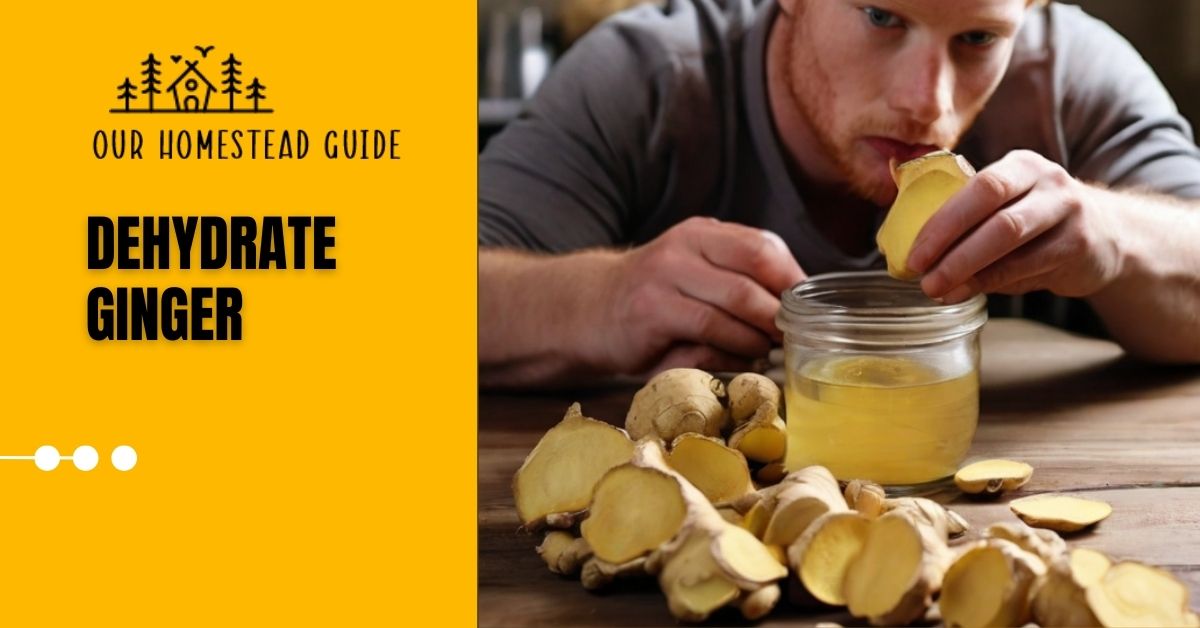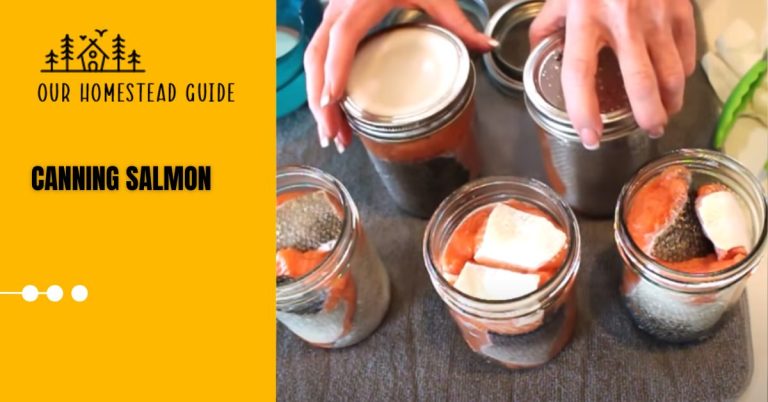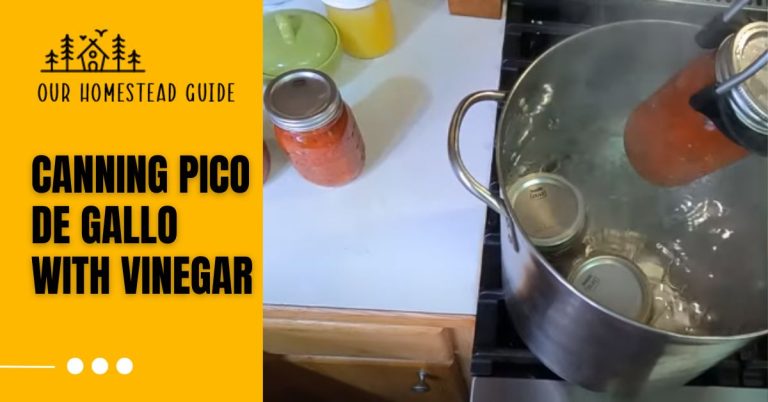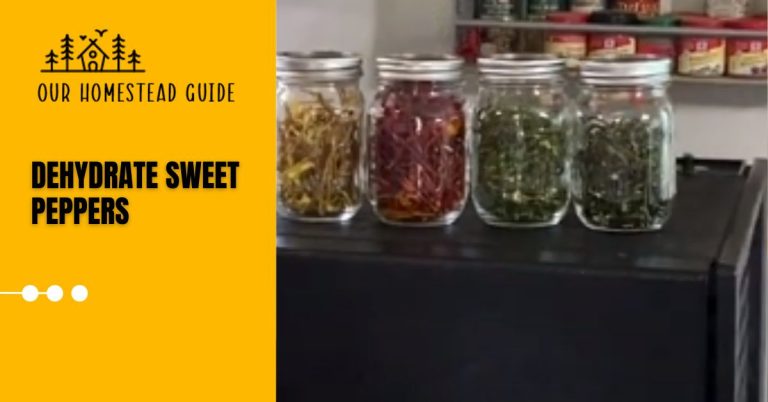How To Dehydrate ginger: Easy Steps Guide
Dehydrate ginger is an excellent approach to increase its shelf life while preserving its rich flavor and scent. This method removes moisture from fresh ginger, leaving concentrated ginger chunks that can be utilized in a number of culinary preparations.
Dehydrating ginger opens you a world of possibilities, whether you’re an avid home cook wishing to add a burst of ginger’s particular zing to your recipes all year or a health-conscious individual searching for a simple and healthy snack. In this lesson, we will look at the benefits of dehydrating ginger, the simple procedures to do it, and creative ways to use this versatile herb in your cooking.
Instructions in Steps
Equipment Required:
- Ginger, freshly grated
- a good knife or peeler
- A food dehydrator or an oven
- Paper towels or dehydrator trays
How to Dehydrate ginger?
Step 1: Select and Prepare the Ginger
The first step in the dehydration process is to choose and prepare the ginger. To begin, choose fresh ginger root that is firm and free of mold or soft places, and that shows no symptoms of rotting. After you’ve chosen your ginger, thoroughly wash it to remove any dirt or contaminants.
After washing, gently remove the skin with a knife or peeler, revealing the aromatic and tasty flesh beneath. You set the setting for a successful and enjoyable dehydrating experience by starting with excellent ginger and taking care throughout the preparation.
Step 2: Slice the Ginger
After cleaning and peeling your ginger, the next stage in the dehydration process is to slice it into thin, uniform slices. A sharp knife can be used for a more hands-on approach, or if precision and consistency are desired, a mandoline slicer is a useful tool to have. The thinness and uniformity of the slices are critical for even drying and reliable results.
Whether you slice by hand or with a kitchen tool, taking care with this step will add to the success of your dehydrated ginger and assure a delicious blast of ginger flavor in your culinary creations.
Step 3: Preheat Your Dehydrator or Oven
It is critical to preheat your dehydrator or oven to the optimum temperature before beginning the drying process. If you’re using a dehydrator, set it to 125-135°F (52-57°C), which is perfect for maintaining the flavor and nutritional content of the ginger. If you’re using an oven, though, preheat it to the lowest temperature setting available, which is normally approximately 150°F (65°C).
Making sure your appliance is at the proper temperature before you begin will help to preserve the quality of your Dehydrate ginger and yield the finest results.
Step 4: Arrange the Ginger Slices
After preheating your Dehydrate ginger or oven to the correct temperature, arrange the ginger slices for drying. Place them in a single layer on parchment paper or dehydrator trays, making sure they don’t touch. This spacing is critical because it provides for adequate airflow around each slice, resulting in even and fast drying.
Adequate airflow is essential for eliminating moisture from the ginger slices and preventing them from sticking together when drying. Dehydrate ginger You set the setting for properly dehydrated ginger that can be used in a variety of culinary applications with careful positioning.
Step 5: Dehydrate
The dehydration procedure is now putting your patience to the test. It usually takes 4-6 hours to completely dehydrate ginger slices in a dehydrator. The exact time will depend on variables such as slice thickness and humidity levels. If you use an oven, the process will take approximately 6-8 hours. It is critical to keep the oven door slightly ajar to facilitate thorough drying.
Dehydrate ginger This allows moisture to escape, preventing the ginger from heating rather than drying. Check the ginger slices for dryness on a regular basis, and when they become crispy and break easily, they are ready for the next stage of your culinary adventure.
Step 6: Check for Dryness
Perform a simple touch test to see if your ginger is thoroughly dehydrated. When the ginger slices are dry to the touch and have a crisp texture, they snap rather than bend when lightly pressed. This dryness indicates that the moisture has been effectively removed, ensuring the longevity and concentrated flavor of the ginger.
Once you’ve reached the correct consistency, your Dehydrate ginger is ready to be kept and utilized in a variety of culinary delights, including teas and spice mixes, baked products, and savory foods.
Step 7: Cool and Store
After successfully Dehydrate ginger to the appropriate sharpness, the following stages are to properly cool and store it. Allow the dehydrated ginger to cool completely at room temperature before proceeding. This procedure ensures that any residual heat or moisture is removed before storing. Once cold, store the ginger slices in an airtight container to keep them fresh.
Store the jar in a cool, dark place, away from direct sunlight and dampness, as these elements might degrade the quality of the ginger over time. Your dehydrated ginger can be enjoyed for an extended amount of time if properly cooled and stored, ready to offer a burst of flavor and aroma to your culinary creations whenever needed.
Nutritional Value of Dehydrated Ginger
| Nutrient | Amount Per 100g |
| Calories | 335 kcal |
| Total Fat | 4.2 g |
| Saturated Fat | 1.1 g |
| Cholesterol | 0 mg |
| Sodium | 27 mg |
| Total Carbohydrates | 71.6 g |
| Dietary Fiber | 14.1 g |
| Sugars | 3.7 g |
| Protein | 9.1 g |
| Vitamin C | 12.2 mg (20% DV) |
| Vitamin B6 | 0.6 mg (29% DV) |
| Calcium | 114 mg (11% DV) |
| Iron | 3.8 mg (21% DV) |
| Magnesium | 214 mg (54% DV) |
| Potassium | 1325 mg (38% DV) |
| Phosphorus | 168 m |
Benefits of Dehydrate ginger
Dehydrating ginger, which entails eliminating the moisture from fresh ginger root, has various advantages, including:
Longer shelf life:
Dehydrated ginger has a far longer shelf life than fresh ginger. You may avoid mold and deterioration by reducing the moisture content, allowing you to preserve it for a prolonged amount of time without refrigeration.
Convenience:
Dehydrated ginger is light, compact, and convenient to keep. It takes up less room in your kitchen and is easily accessible anytime you use it. This convenience can save you grocery shop trips and prevent food waste.
Enhancements to flavor and intensity:
Dehydrated ginger has a more concentrated and powerful taste than fresh ginger. This is useful if you want to add a ginger kick to your dishes without adding moisture from fresh ginger.
Versatility:
Dehydrated ginger may be used in a variety of culinary applications, including cooking, baking, and the creation of spice mixes. It may be pounded into a powder, crushed, or rehydrated for use in a variety of cuisines, including soups, stews, baked goods, and marinades.
Portability:
Dehydrated ginger is a practical solution for individuals who want to travel with their own spices or flavorings. Its lightweight and small design makes it easy to transport in a suitcase or backpack.
Waste reduction:
Dehydrating ginger is a good strategy to prevent food waste. Excess ginger may be dehydrated to keep it from rotting before you need it, and then rehydrated as needed.
Cost-effective:
Dehydrating ginger at home can be a cost-effective strategy to store surplus ginger and minimize the frequency with which fresh ginger is purchased. It enables you to take advantage of bulk or discount ginger costs.
Health Advantages:
Ginger has been linked to a variety of health advantages, including anti-inflammatory and digestive characteristics. Because dehydrated ginger keeps many of these beneficial properties, you may include it in your diet all year.
Notes on Ginger Dehydration:
Quality is Important:
Begin with high-quality fresh ginger. In terms of flavor, aroma, and shelf life, the quality of the raw ginger root has a significant impact on the final dehydrated product.
Uniform Slices:
To promote even drying, slice the ginger uniformly. Consistent slice thickness enables for consistent moisture removal, resulting in better results.
Dehydrate ginger Check in on a regular basis:
During the dehydration process, keep a tight eye on the ginger. Excessive drying might result in a burned or too-strong flavor. The ginger should be crisp and dry to the touch, but not burnt or discolored.
Most Frequently Asked Questions!
1- Why should I dehydrate ginger?
Ginger may be preserved for long-term preservation by dehydrating it. By removing the moisture, it helps keep ginger fresh longer and makes it possible to use it as a spice or in baking and cooking.
2-What equipment do I need to dehydrate ginger?
To dehydrate ginger, you’ll need an oven or a food dehydrator. Ginger may be made ready for drying with the use of a mandoline slicer, peeler, or sharp knife.
3-How do I prepare ginger for dehydration?
Ginger root: wash and peel. Next, cut it into thin, even slices or chunks. This promotes uniform drying.
4-What’s the recommended drying temperature and time?
Dehydrate food for four to six hours by setting the temperature in a food dehydrator to around 135°F (57°C). Use the lowest oven temperature, usually about 140°F (60°C), and give it two to four hours. When the ginger starts to get brittle, it’s ready.
5-Should I blanch ginger before dehydrating?
Before drying ginger, some people blanch it for a short while to help retain its flavor and color. Although not necessary, this can be a beneficial step.
6-How do I store dehydrated ginger?
Dehydrated ginger should be kept in a cold, dark area in an airtight container. Glass jars or vacuum-sealed bags are good containers. Dehydrated ginger keeps well for many months to a year in storage.
7-Can I use dehydrated ginger in recipes?
Yes, dehydrated ginger may be used in a variety of recipes. Just soak it in warm water to rehydrate it, or add it straight to soups, stews, and other recipes.
8-What are the benefits of dehydrated ginger?
Ginger that has been dehydrated still has most of its nutrients and taste. It’s easy to store for an extended period of time, requires minimal room, and works well in recipes all year round.
9-Can I use dehydrated ginger for making ginger tea or ginger powder?
Yes, dehydrated ginger may be used to make powdered ginger or tea. Dried ginger can be ground into a fine powder and added to hot water to make tea or used as a flavoring.
10-Are there any safety precautions when dehydrating ginger?
Make sure your oven or dehydrator is clean and operating correctly. Always refer to the manufacturer’s instructions for the particular equipment you are using. To prevent moisture and deterioration, keep the dehydrated ginger appropriately.
you may also like this article.





